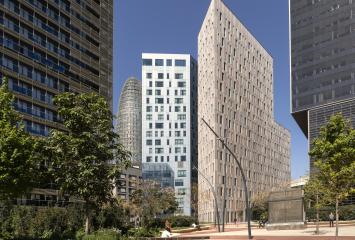What is a smart office like?
Created to increase productivity, encourage concentration, communication and collaborative working, smart offices use technology to transform workspaces.
Offices with smart technology aim to improve the experience and efficiency of employees, reduce expenses and energy consumption and add value to buildings. Greats examples of this are Google and Facebook, two large companies that are pioneers in implementing their technological and digital transformation within their respective organizations, adapting new market needs to their offices and employees.
In today’s blog we will examine some of the key features that make offices smart.
Use of the loT (Internet of Things)
The IoT refers to objects connected to the Internet, allowing them to be controlled remotely or to collect and share data and communicate without the involvement of human beings. A smart office therefore uses connected equipment that monitors, controls and manages various operations and working conditions.
Use of the IoT can bring several benefits such as:
- optimized office design by learning the working habits of employees
- creation of a pleasant office environment by controlling temperature and environmental conditions
- reductions in energy consumption by optimizing heating, air conditioning, lighting, cleaning, etc.
- improved employee well-being through environmental monitoring, water monitoring and more efficient cleaning.
Sustainable design
The future calls for increasingly more sustainable buildings. Use of technology is directly linked to respect for the environment. Thanks to technology, for instance, it is possible to program how bright the lights are or the height of blinds, taking into account the level of sunlight at any one point.
Virtual desktops
These are digital spaces hosted on the cloud, which allow users to access them remotely at any time and from anywhere, thus making the working experience more efficient.
Security
A smart security system allows you to control who can enter the office, giving access to staff only when they clock in, as well as protecting equipment and materials using fire alarms and cyber security to protect digital files.
In the digital age companies that want to be competitive must adapt quickly to the changes brought about by technology. Opting for a smart office therefore not only means improving the working experience but also contributing to creating an innovative corporate identity.

